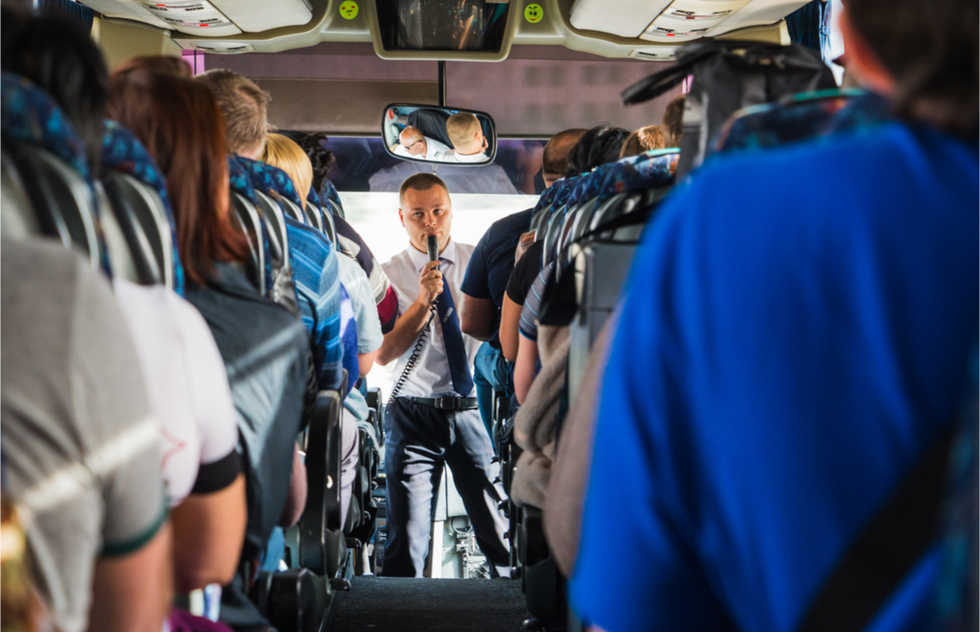Even in the best of times, group tours are tremendously complicated travel products.
A tour company not only has to create an appealing itinerary. It must also arrange for all accommodations for the group, provide in-country transportation, pre-reserve and buy admissions to touristic sites, and hire one or more expert guides.
Sometimes the company also contracts with local restaurants and hotels to provide meals and with local venues to offer entertainment.
That's a lot of balls to juggle.
So it shouldn't come as a surprise that the current return to travel has been a particularly bumpy one for tour operators—and their customers.
I learned just how bumpy from one Frommer's podcast listener who emailed FrommerTravelShow@yahoo.com to ask my opinion about whether she should put down a deposit for a Scandinavian tour.
She was nervous for a couple of very logical reasons.
First, she was being pressured to put the deposit down even though the countries in question hadn't yet opened to American visitors. Second, the company told her that she'd only be able to reschedule the tour one time if for some reason she wanted to delay the original date.
Last, she was asked to sign a waiver "that basically states they won't guarantee that we'll do everything that's on our itinerary," she wrote.
I was very surprised to hear about the rebooking restriction. Early on in the pandemic, as we reported, most of the major tour operators put very flexible cancellation and rebooking policies in place.
I reached out to Christian Wolters, Chief Marketing Officer of the tour marketplace site TourRadar, and he agreed with me that the "rebook once" provision was not common.
"The majority of tour operators are adapting [to the current pandemic] and put in place the new policies, like lifetime travel credits that you can use anytime," Wolters noted.
But he told me that the last waiver—the one about not being able to guarantee the itinerary will remain intact—was actually standard procedure. He said most companies simply put this type of agreement into the fine print of their reservation contracts.
"These types of disclaimers were common pre-Covid and are today, too, because there are always situations—border closures, environmental issues, weather problems, traffic accidents, and more—that are outside of the tour operator's control. Because a tour has so many different elements to it, there could be unforeseen situations, and it's the primary responsibility of the tour operator to keep guests safe. So sometimes itinerary changes have to happen."
So what was my advice to the would-be traveler? It boiled down to the following points:
Don't let yourself be pushed into a big purchase.
What concerned me most about our podcast listener's situation was that she seemed to be getting a lot of pressure from the tour operator in question to book right away. The truth is there are many companies selling the same tours.
Before biting, it's not a bad idea to look at the tour marketplace sites like TourRadar or TravelStride to see what the competition is offering. Both will quickly show you price comparisons and details of tours from multiple companies. Through a second link on each site, you can also see the cancellation policies for each company.
A good travel agent can also be invaluable for their knowledge of the industry and common cancellation policies. Consulting with a travel agent can be a convenient way to find out the same sort of information without doing lots of legwork yourself. Remember, though, that you may pay a fee for this type of advice, and not every agent works with every tour operator out there.
Consider travel insurance.
For big-ticket purchases, that's always a good idea. This year, it may be worth it to buy "cancel for any reason" (CFAR) coverage. This would allow you to ditch a trip that has changed from the one you thought you were purchasing (perhaps because of pandemic conditions) and you no longer want to take.
With most forms of standard travel insurance without a CFAR provision, you only get your money back if the vendor cancels the tour or if you get sick and can't go. But adding CFAR ensures you can get a refund simply because you change your mind.
Travel independently.
Though there is value to having a local guide with you during these turbulent times, you might pay less and see more by going it alone.
Traveling solo will allow you to pivot to what interests you (as opposed to what's most convenient for the tour operator) should the situation on the ground force you to change some part of your itinerary.
And self-led travel can be a very tour-like experience, thanks to such sites as Evaneos which introduces visitors to local travel agents around the world to help them craft a smart itinerary replete with personal tours and unique experiences.
Such sites as ToursByLocals, Viator, and Airbnb.com/Experiences can hook you up with group tours on a day-by-day basis.






